Writing The Next Generation
Star Trek: The Next Generation’s first season was notorious for its poor treatment of writers. “It was like Vietnam,” said Herbert Wright, who co-produced every episode up to “Skin of Evil”, but who left before the end of the season despite his friendship with Gene Roddenberry. Writers would be “given a script to write or revise and before they could learn what the show was about, they’d be torn apart by the staff and thrown to the wolves, or Gene would say, ‘I hate them,’ and they’d be out the door.”
Wright blamed Roddenberry’s attorney, Leonard Maizlish, whom Roddenberry allowed extraordinary involvement for fear of losing control of the franchise again. (Roddenberry was sidelined from the Star Trek movies after the lackluster The Motion Picture.)
The attorney was giving us notes on scripts and secretly rewriting them at night, taking people’s names off and putting other people’s names on. He would call up writers at home — freelancers — ask them what was going on, how they were doing. It was horrible and one of the principal reasons I left.
Dorothy Fontana and David Gerrold, veteran writers of The Original Series, also left The Next Generation because of Maizlish. Gerrold suspected he influenced Roddenberry in rejecting his script for “Blood and Fire”, which would have featured Star Trek’s first openly gay couple.

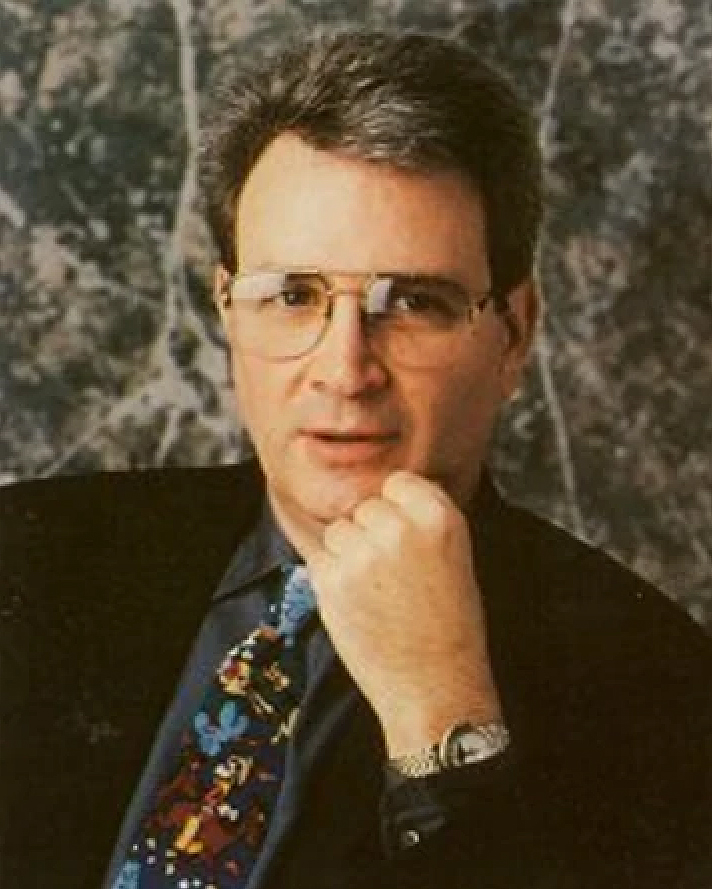
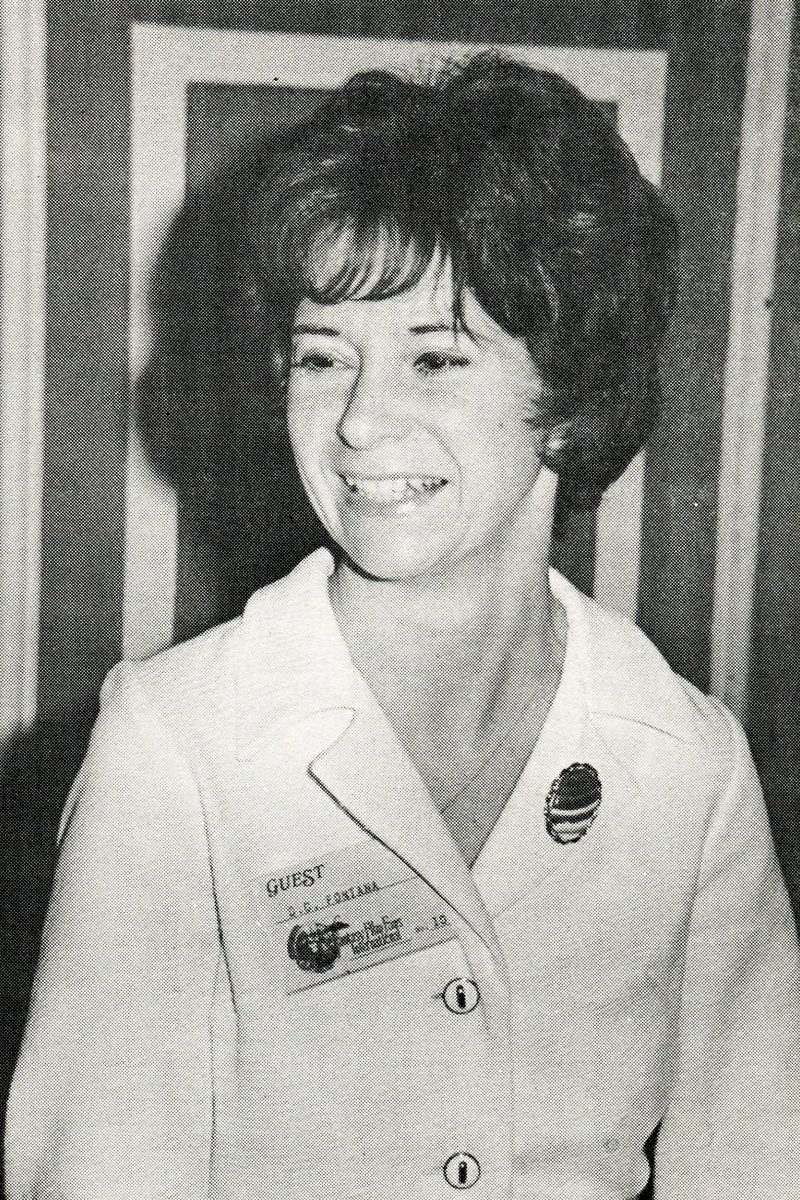
Even though Roddenberry maintained that, “Some of our best scripts were done by non-science-fiction writers,” many struggled with his ban on personal conflict between the crew.
Roddenberry defended this decision to the end, telling Cinefantastique shortly before his death in 1991 (My Star Trek Scrapbook has the full interview),
You can hardly have people from this ideal world with the same smallness people have today.
Rick Berman, who took over day-to-day management of the show when Roddenberry’s health declined, and who would officially become executive producer in Season 3, admitted in an early 1990s interview that Roddenberry’s perfectionism caused many writers to leave, “either willingly or not.”
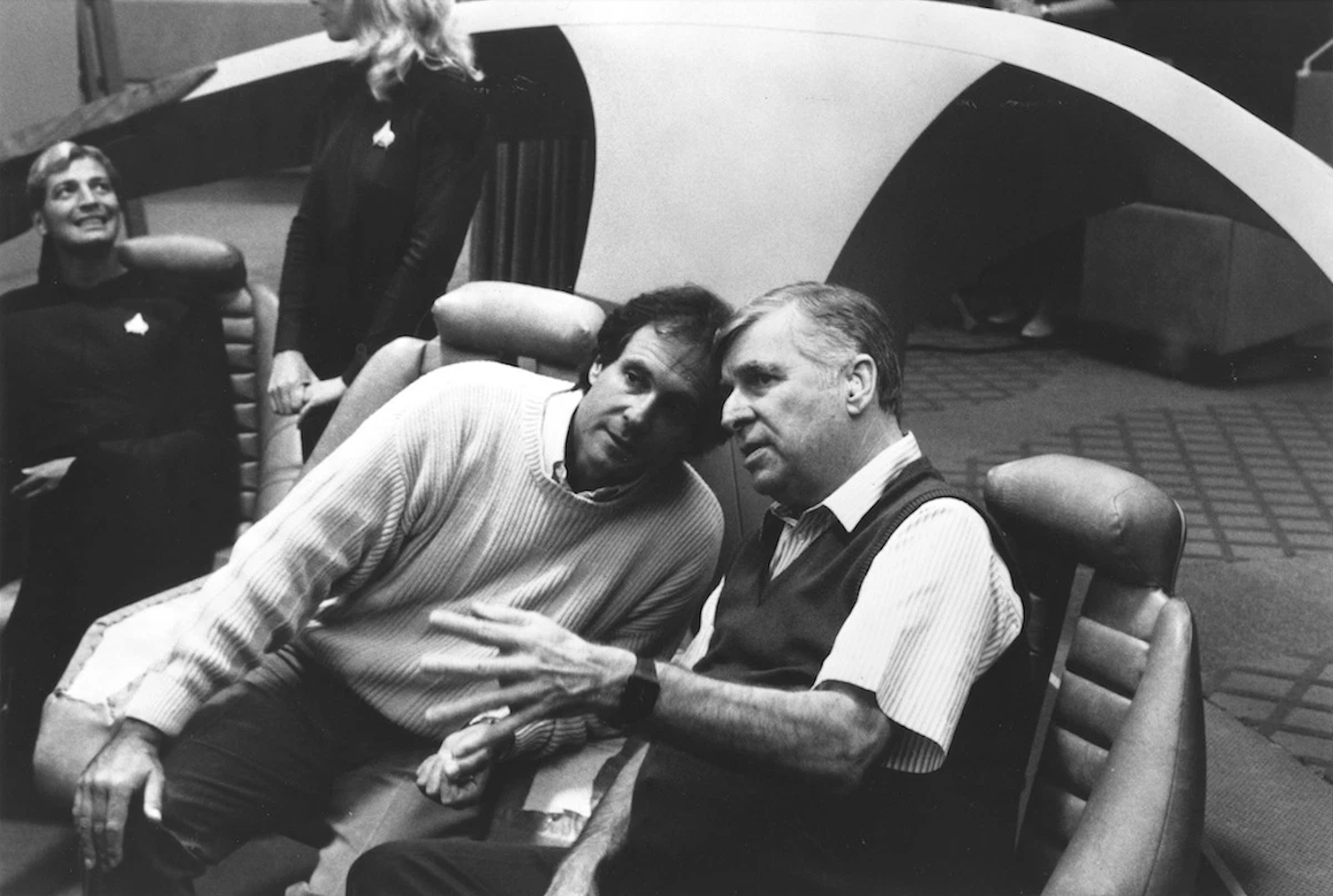
But even Berman revealed years later that Maizlish had had a nefarious influence by passing off his own notes on scripts as Roddenberry’s.
With so much chaos in the writers’ room, the first season would often rehash storylines from The Original Series. “The Naked Now” was a sequel to “The Naked Time”. “Code of Honor” borrowed themes from “Amok Time”, “Haven” from “Elyaan of Troyius”. The setting of “Justice” was reminiscent of “The Apple”. “When the Bough Breaks” is an amalgam of The Original Series clichés, from the discovery of a mystical planet (“Way to Eden”) that is home to a seemingly perfect society (“Plato’s Stepchildren”) that is controlled by a computer (“Return of the Archons”, “For the World Is Hollow and I Have Touched the Sky”) which its residents have forgotten how to control (“Spock’s Brain”).
Where The Next Generation was original, the results were mixed.
“Angel One” may have been intended as feminist (Roddenberry regretted how women had been portrayed on The Original Series), but ended up as – in the words of Gates McFadden – “one of the most sexist episodes we ever had.”
“The Last Output” introduced the Ferengi, who never became the villains they were intended to be.
“The Big Goodbye” and “11001001” took advantage of the holodeck, a technology Kirk’s Enterprise had lacked. “Heart of Glory” was a story that could only be told now that the Federation and Klingons were at peace.
Playing it safe
When Season 2 got underway, Maizlish was banned from the studio and Maurice Hurley became head writer. He swapped McFadden for Diana Muldaur as ship’s medical officer, which created opportunities for tension between the tech-wary Dr Pulaski and Data, but Hurley was otherwise a stickler for Roddenberry’s vision, telling Edward Gross in 1990:
If you can’t deal with that, you can’t do the show. There are rules on top of rules on top of rules… Gene sees this pollyannaish view of the future where everything is going to be fine. I don’t believe it, but you have to suppress all that and put it aside. You suspend your own feelings and your own beliefs, and you get with his vision – or you get rewritten.
One of the writers who couldn’t accept Hurley’s firm hand was Tracy Tormé. Hurley had rejected his script for “Conspiracy” during the first season, but had been overruled by Berman. When Hurley rewrote Tormé’s “The Royale” and “Manhunt”, the latter refused to put his name on either episode. He later complained in interviews that The Next Generation was playing it safe.
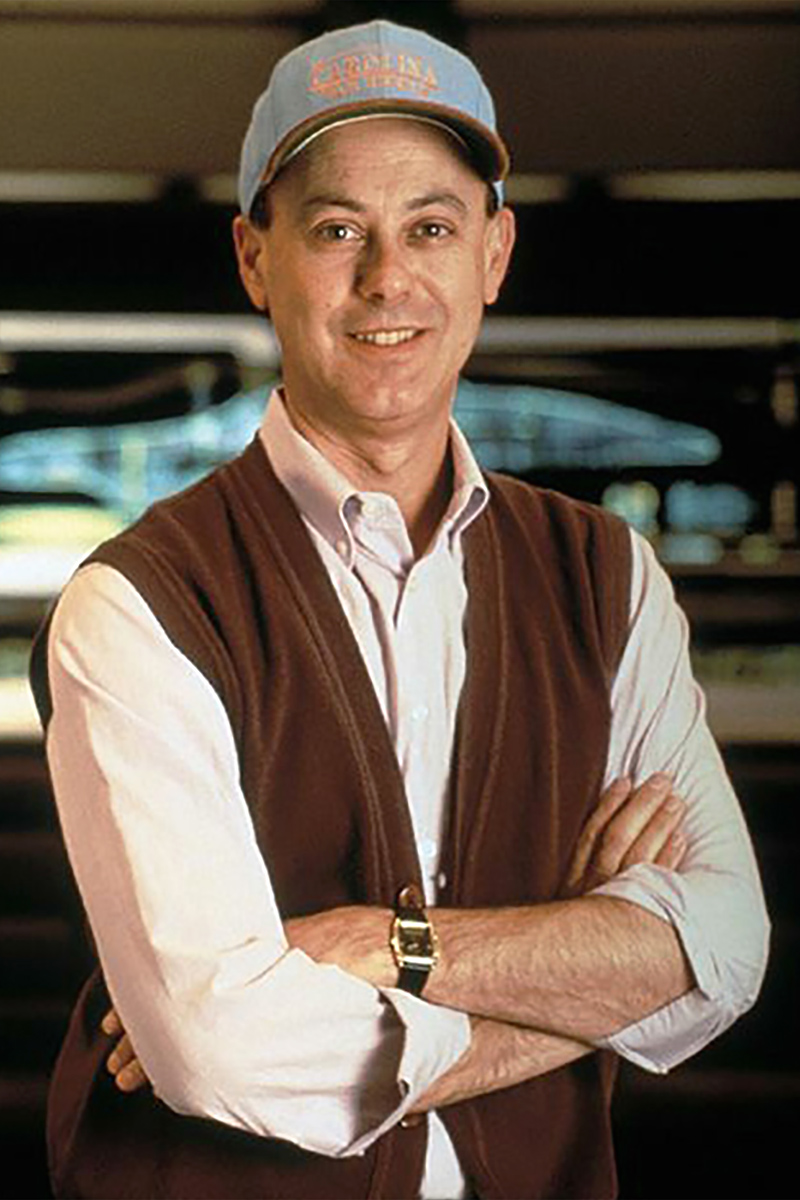
That would become a recurring criticism after Michael Piller took over from Hurley in Season 3 (and McFadden was brought back). Piller brought much-needed calm to the writing staff, but his focus on character as opposed to science fiction was a double-edged sword. It made it easier to write compelling drama, but the show lost some of its edge.
Piller accepted the criticism: “The shows that I find the most disappointing are where we have a wonderful character piece and a weak science-fiction story.” He demanded that every episode had at least some alien element, but sometimes that felt forced:
It’s a wonderful character development piece of drama and some parasite or some dripping goo or some asteroid disaster that’s looming has to be forced into the story. We do our best to avoid those, but sometimes they happen.
One obvious reason, said Brannon Braga – who was hired as a full-time writer after doing an internship for the series – was lack of budget. “We can’t see a new planet every week.”
The Next Generation spent about $1.3 million per episode, which would be $2.5 to $3 million in 2022 money. It made The Next Generation expensive for its time, but it’s far less money than Star Trek: Discovery and Picard have: $8 to $9 million per episode.
Hitting its stride
Piller did fulfill his other dictum: he wanted every episode to be about a character’s growth in some way. This also gave the secondary cast a chance to shine: LeVar Burton in “Booby Trap” and “The Enemy”, McFadden in “The High Ground”, Marina Sirtis in “The Price” and “Tin Man”, Wil Wheaton in “Evolution”. “Sins of the Father” was the beginning of a Klingon act written by Ronald D. Moore which put a spotlight on Michael Dorn. Denise Crosby returned in “Yesterday’s Enterprise”, which was also one of Ira Steven Behr’s first major script contributions. Behr and Piller would go on to co-create Deep Space Nine.
Toward the end of Season 3, The Next Generation had matured to the point that Piller felt comfortable harkening back to The Original Series, something Roddenberry had resisted during Seasons 1 and 2. Mark Lenard was invited to reprise his role as Sarek, Spock’s father, in the episode of the same name. Leonard Nimoy had to wait until Season 5, when Piller brought Spock back in the two-parter “Unification”.

Hurley’s most enduring contribution to Star Trek was the introduction of the Borg in “Q Who”. Piller brought them back with a vengeance in “The Best of Both Worlds”, which many fans list as their favorite episode of The Next Generation. It was the first time Star Trek ended a season on a cliffhanger, and even Piller didn’t know how the story would end when he wrote the first half. Partly because his own contract was up for renewal and he wasn’t sure if he wanted to return. Partly because there was some doubt if Patrick Stewart would do another full season.
Both men did return and helped make Season 4 one of the The Next Generation’s strongest. “It was really the show hitting its stride for the first time,” according to Braga. Moore picked up the threads of “Sins of the Father” in “Reunion” and “Redemption”. “The Wounded” introduced the Cardassians, who would play a major role in Deep Space Nine.
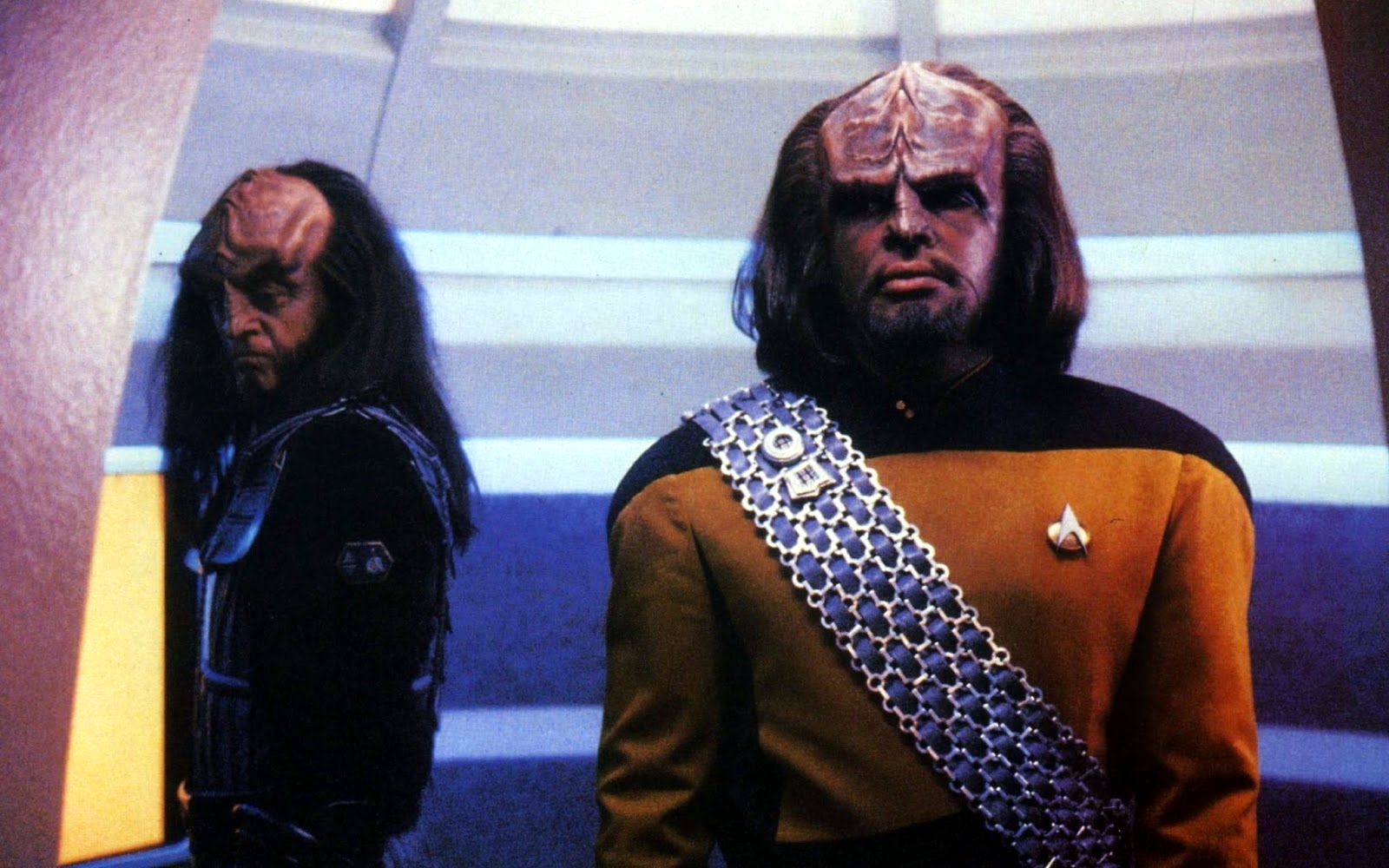


B-stories
Braga defended the use of B-stories: “There’s a feeling that you need that jeopardy story… to drive the story forward.” But he recognized it didn’t always work. In the episode “In Theory”, where Data learns about love while parts of the ship are dematerializing. “I wanted to see more of the Data arc. I didn’t want to see that other story at all.”
Wright lamented that “the B-story is always the science-fiction story.”
Science fiction has been relegated to a B-story. If you can’t do science fiction as an A-story on Star Trek, where the hell can you do it as an A-story?
Berman invited Wright back in Season 5 to – as Wright put it – “help pump more weirdness into the show.” He noticed the atmosphere in the writers’ room had changed dramatically from Season 1:
People were so much happier and calmer and quieter and really helping each other. It was a kinder, gentler place to be.
But he also felt the show had gone “soft” and left again after writing “Power Play”, in which Data, Troi and Miles O’Brien (Colm Meaney) are possessed by aliens and hijack the Enterprise.
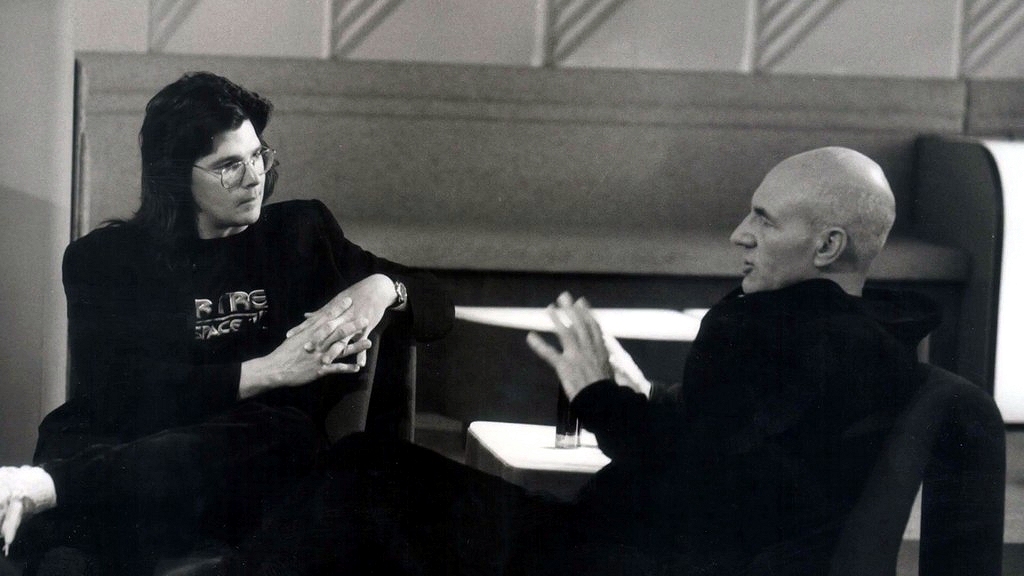
Moore disagreed there wasn’t enough conflict:
It’s just a question of how loud that volume is. We’ve had a lot of shows where Riker and Picard have been at each other this past year. “The Outcast” is a good example. Picard versus Wesley, Beverly at odds with Picard and Riker versus Worf in “Ethics”. They’re just not driven to the level of the twentieth century, where they hit each other or they really shout a lot. The volume is quieter, but it doesn’t mean the conflict isn’t there.
But Jeri Taylor, who took over as co-executive producer when Piller moved on to Deep Space Nine in 1992, recognized in an interview with Cinefantastique that year the “the science-fiction aspect of Star Trek” wasn’t “getting all the play that it needs.”
Sometimes we get political. We get emotional, but are we really going with the weirdness of the Roddenberry universe?
Clichés
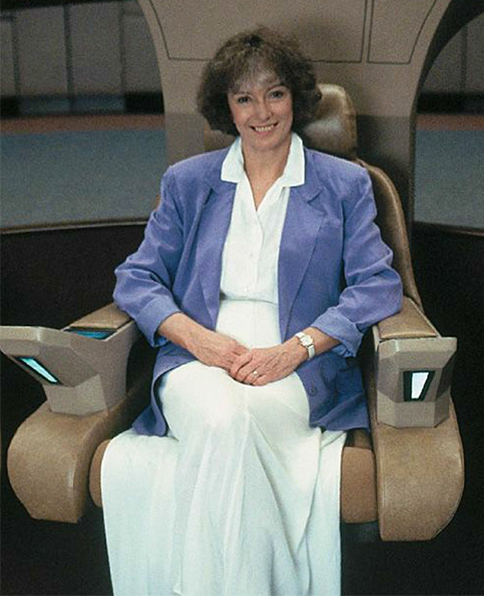
Season 5 shook things up. It introduced the Bajorans and Ensign Ro (Michelle Forbes). The Bajoran resistance to their Cardassian occupation gave Deep Space Nine, which launched the following year, its starting point. Highlights of the season – “Darmok”, “Cause and Effect”, “The Inner Light” – were exactly the type of science-fiction stories only Star Trek could tell. But Taylor recognized that, “When you’ve done as many as we have, they get harder and harder to scratch for.”
Berman agreed. “Star Trek at its best is good allegory,” he said.
That’s tough to come up with after 126 episodes. We’ve probably hit on forty different issues. After a while it becomes a little difficult and in the same way it becomes tougher to find original stories.
Various episodes dealt with disease, reflecting the growing impact of the AIDS epidemic. The Iran-Contra scandal inspired the arms-for-hostages story of “Too Short a Season”. A charismatic politician puts his own interests before his people’s in “The Ensigns of Command”. “The Hunted” showed a society unable to reincorporate its war veterans, “The Wounded” a veteran of war unable to return to society. “The High Ground” was such an obvious allegory for the Troubles in Northern Ireland that broadcasters in Ireland and the United Kingdom refused to air it. “The Host” and “The Outcast” dealt with gender, “Hollow Pursuits” and “The Game” with addiction, “Half a Life” and “Ethics” with suicide.



The Next Generation was the only show on television at the time that accepted submissions. Ronald Wilkerson, one of the more prolific freelancers for the show, who wrote what became “Imaginary Friend”, “Schisms”, “Lessons” and “Lower Decks”, told Cinefantastique in 1994 that outsiders like him could something give “a different spin to the characters than the staff.”
The downside was that the permanent writing staff received a lot of scripts – some 3,000 per season – ridden with clichés. They named the most common ones:

- Let’s Make Whoopi: Stories about Guinan.
- Milk Cartons: Stories involving a missing person.
- Weird Science: Bizarre science-fiction concepts.
- Eco-Disaster: Environmental disaster threatens a planet.
- WGETWE: “We got ’em, they want ’em.” A story in which the Enterprise has a person who is wanted by another race.
- Data Becomes Man: Not to be confused with Data Becomes God, which is a separate category.
- Separation Anxiety: Any story that involves a saucer separation.
- Room With a Q: Any story involving Q. Also the most often pitched Q title.
- Jack’s Back: A story involving Jack Crusher.
- Pederast: Stories involving children.
- Let’s Put on a Show: Dr Crusher doing a play or musical number.
- Ferentyl: A female Ferengi is passed off as male.
- Space Spy: Star Trek characters as James Bond.
- Double Trouble: A member of the crew is duplicated.
- Droids R’ Us: Introduces another android.
One frequently pitched idea the writers did ultimately develop was Troi losing her empathic powers in “The Loss”.
Breaking the format
Season 6 abandoned the combination of A- and B-plot. “Every week the ship was in jeopardy from this, that, or the other thing,” Taylor told Cinefantastique. “There was a certain staleness that was beginning to creep in.”
Piller felt there was improvement under Taylor’s leadership:
There’s no question in my mind that the sixth season was far superior to the fifth season. … I believe that we’ve taken more risks. We’ve expanded several characters in fundamental ways.
And they had more fun:
I think there are some wonderful episodes that don’t take themselves so seriously that are nice breaths of fresh air counterbalanced by episodes that take themselves terribly seriously and are some of the great television shows of the season.

Berman admitted he had been too careful. “I tend to be the most conservative member, trying not to break format too often,” he said. He finally accepted the need to expand the envelope. “You’re a little more prone to break the rules in the sixth season than you are in the third.”
“Relics” notably brought back James Doohan as Montgomery Scott. “Rascals”, “A Fistful of Datas” and “Ship in a Bottle” brought comic relief. “Chain of Command”, on the other hand, was perhaps the darkest episode The Next Generation ever did with David Warner, who two years earlier had played Klingon chancellor Gorkon in Star Trek VI, torturing Captain Picard.
Running out of steam
By Season 7, the writers really were running out of ideas. Moore told Cinefantastique in 1994 that, after writing the characters for five seasons, “I didn’t have a lot else to say.”
That doesn’t mean the characters were dried up, but I didn’t know what else to do with them. I didn’t know what else to do with Worf or what other love interests I could give Picard. You knew Worf’s backstory like the back of your hand. We’ve done Data’s family and all his other androids.
Braga put it more succinctly: “We were running out of steam.”
After a mediocre start, with such lackluster episodes as “Dark Page”, “Liaisons”, “Phantasms” and “Gambit”, Piller instructed Taylor to use the remainder of the season – which would be the series’ last – to revisit as many themes as the show had set up over the years as possible.




“We wanted to make sure that the last episodes about the characters were strong and effective,” Taylor said.
No longer needing to keep the characters available for romances of the week, “Attached” tackled the long-simmering attraction between Crusher and Picard while Troi and Worf grew closer in “Parallels”, “Eye of the Beholder” and the series finale, “All Good Things…”
“Inheritance”, “Homeward” and “Sub Rosa” dealt with the families of Data, Worf and Crusher, respectively.
“Journey’s End”, “Firstborn” and “Preemptive Strike” wrapped up the stories of Wesley, Worf’s son Alexander and Ensign Ro.
And, of course, “All Good Things…” completed the story that had started it all seven years earlier by giving Picard one last chance to prove humanity’s worth to Q (John de Lancie).


